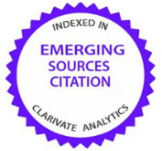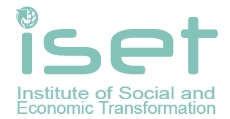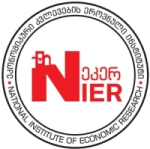Impact of New Quality Productive Forces on the High-Quality Development of the Construction Industry: Evidence from China
Abstract
Introduction. Recognised as an emerging and advanced mode of productivity, new quality productive forces (NQPF) have significantly contributed to the development of various industries. Investigating their influence on the high-quality development of the construction industry (HDCI) can offer theoretical support and practical guidance for the transformation and upgrading of the industry. This includes improving quality and efficiency, advancing green development, and promoting sustainable practices. Such efforts are of great significance for the high-quality development of the national economy.
Aim and tasks. This study aims to develop an index system for assessing the impact of new quality productive forces on the high-quality development of the construction industry, and empirically examines their relationship within the context of industrial structure modernisation.
Results. The regression coefficient of NQPF on HDCI was 0.293, and all regression results remained positive after the sequential inclusion of the control variables. The regression coefficient of NQPF on industrial structure upgrading was 0.056, whereas the regression coefficients of NQPF and industrial structure upgrading on HDCI were 0.201 and 0.256, respectively. A bootstrap test involving 1,000 resampling iterations was performed, and the resulting confidence interval was [0.0005, 0.0406], which does not include zero. The results of the regional heterogeneity analysis indicate that the positive effect of NQPF on HDCI was strongest in the eastern region (0.348), followed by the western region (0.132), with the impact on the central region being statistically insignificant. After applying the robustness checks, all regression results remained positive and statistically significant at the 1% level.
Conclusions. This study develops a framework for analysing the impact of NQPF on HDCI and provides recommendations for the forthcoming construction industry and related policy research. Under the NQPF policy framework, the impetus to promote high-quality development of China’s economy and construction industry is reasonably policy-driven, featuring industrial upgrading and regional optimisation in synergy with technological popularisation. Policy choices under the NQPF regarding China’s construction industry and the high-quality development of its economy are of critical importance. Moreover, they further contribute to the promotion and enhancement of environmental sustainability.
Keywords:
NQPF, HDCI, industrial structure upgrading, productivity, technological innovation.References
Chen, X. F., Li, S. Q., & Wu, S. S. (2025b). The Cultivation of Intelligent Accounting Talents under the Collaboration between Industry and Education in the New Quality Productivity. Friends of Accounting, (09), 147-153.
Ding, Z. K., & Liu, Z. W. (2023). Digital Development Trend of Construction Industry under the Metaverse. Construction Economy, 44(04), 5-14. http://doi.org/10.14181/j.cnki.1002-851x.202304005
Dong, J. B., Zhang, M., & Cheng, G. B. (2022). Impacts of Upgrading of Consumption Structure and Human Capital Level on Carbon Emissions—Empirical Evidence Based on China’s Provincial Panel Data. Sustainability, 14(19), 12373. http://doi.org/10.3390/su141912373
Duan, H. Y., Chen, S. Y., Liu, Y. Y., Zhang, S. P., Wang, X. N., Wang, S., & Song, J. N. (2020). Characteristics of reginal energy consumption of China's construction industry from the perspective of life cycle. China Population, Resources and Environment, 30(07), 57-65.
Gao, H. J., & Li, X. D. (2021). Research on Evaluation for HDCI Based on Matter-element Extension Model. Construction Economy, 42(11), 85-89. http://doi.org/10.14181/j.cnki.1002-851x.202111085
Gao, M. Y., Cao, M., Huang, H., & He, Q. (2024). Research on the Connotation, Characteristics and Development Path of New Quality Productive Force. The World of Survey and Research, 11, 27-35. http://doi.org/10.13778/j.cnki.11-3705/c.2024.11.003
Gao, T.Y. (2024). New Quality Productive Forces Promote and Facilitate High-quality Development. Highlights in Business, Economics and Management, 45, 491–495. https://doi.org/10.54097/vk9jet43
Han, P., & Li, K. (2024). The "Change" and "Constancy" in the Intrinsic Logic of Financial Intelligentization Transformation: Based on Marx's Labor Value Theory. Friends of Accounting, (20), 72-77.
Jin, X., Wang, Y. W., & Yin, K. D. (2024). Research on the measurement and spatiotemporal evolution characteristics of new quality productive forces in China's marine economy. Frontiers in Marine Science, 11, 1497167. http://doi.org/10.3389/fmars.2024.1497167
Li, F. Y., Fang, H., & Deng, S. H. (2022). Environmental Regulation, Industrial Structure Upgrading and Technological Innovation: Empirical Data from Guangdong Province in China. Polish Journal of Environmental Studies, 31(3), 2157-2166. http://doi.org/10.15244/pjoes/143919
Li, H., Yang, X., Meng, F. Y., Hou, Y., Zhang, J. S., Zhang, L. Y., . . . Liu, J. Y. (2024). A Dynamic Impact Evaluation of the High-Quality Development of China’s Construction Industry Using the Panel Vector Autoregressive Model. Buildings, 14(9), 2871. http://doi.org/10.3390/buildings14092871
Li, H., Zhang, L. Y., Liu, J. Y., Zhang, J. S., Gao, Z. H., Liu, Y. L., . . . Yang, G. (2024). The High-Quality Development of the Construction Industry in the Context of the Digital Economy—Based on the Mediating Effect of Entrepreneurship. Buildings, 14(11), 3490. http://doi.org/10.3390/buildings14113490
Li, Z., & Cui, H. Y. (2024). On new quality productivity from the perspective of historical materialism: Connotation, formation conditions and effective paths. Journal of Chongqing University (Social Science Edition), 30(01), 129-144. http://doi.org/10.11835/j.issn.1008-5831.pj.2023.12.003
Lin, L., Gu, T. Y., & Shi, Y. (2024). The Influence of New Quality Productive Forces on High-Quality Agricultural Development in China: Mechanisms and Empirical Testing. Agriculture, 14(7), 1022. http://doi.org/10.3390/agriculture14071022
Liu, J. T. (2024). Digital New Quality Productivity Promoting Domestic and International Dual Circulation:Based on Mediating Effect Test of Industrial Structure Upgrading. Journal of Technical Economics & Management, (12), 47-52.
Liu, K. Q., & Wang, G. F. (2024). How Does the Spatial Structure of Innovation Agglomeration Affect Energy Efficiency? From the Role of Industrial Structure Upgrading. Energies, 17(16), 3977. http://doi.org/10.3390/en17163977
Liu, Y. B., Zhao, T. Y., & Gao, S. L. (2023). Can the strategic emerging industry venture capital guidance fund promote enterprise innovation? Industrial Economics Research, (01), 73-85+142. http://doi.org/10.13269/j.cnki.ier.2023.01.008
Pan, D. D. (2025). Entrepreneurship, Venture Capital and County-Level Industrial Restructuring. Modern Economic Research, (05), 80-90. http://doi.org/10.13891/j.cnki.mer.2025.05.011
Ren, Y. X., Wu, Y., & Wu, Z. (2024). Financial Agglomeration, Industry-University Research Cooperation, and New Quality Productivity. The Theory and Practice of Finance and Economics, 45(03), 27-34. http://doi.org/10.16339/j.cnki.hdxbcjb.2024.03.004
Shen, X. B., Chen, Y., & Lin, B. Q. (2021). The Impacts of Technological Progress and Industrial Structure Distortion on China's Energy Intensity. Economic Research Journal, 56(02), 157-173.
Shi, J. X., & Xu, L. (2024). Major Strategic Significance and Implementation Path of Accelerating the Formation of New Quality Productivity. Research on Financial and Economic Issues, 01(01), 3-12. http://doi.org/10.19654/j.cnki.cjwtyj.2024.01.001
Song, J. R., & Tong, X., L. (2024). How New Quality Productivity Affects Industrial Chain Resilience: Theoretical Analysis and Empirical Evidence. Statistics & Decision, 40(14), 17-22. http://doi.org/10.13546/j.cnki.tjyjc.2024.14.003
Sun, J. D., Zheng, M., & Fu, J. W. (2019). Connotation and Policy Suggestions of High-quality Development of Construction Industry in New Era. Construction Economy, 40(05), 5-9. http://doi.org/10.14181/j.cnki.1002-851x.201905005
Sun, Y., & Liu, W. C. (2022). Research on Evaluation of High-Quality Development of the Construction Industry: Taking the Study of Liaoning Province as an Example. Construction Economy, 43(S2), 32-36. http://doi.org/10.14181/j.cnki.1002-851x.2022S2032
Wang, D., & Cheng, X. D. (2024). Study on the path of high-quality development of the construction industry and its applicability. Scientific Reports, 14(1), 14727. http://doi.org/10.1038/s41598-024-64786-y
Wang, M. (2024). New Quality Productivity, Open Innovation and Common Prosperity. Journal of Technical Economics & Management, (12), 35-40.
Wang, W. Z., Qi, Z. F., & Zhang, L. T. (2019). Construction and Evaluation of the Measuring System for High-quality Development of Construction Industry in New Era. Construction Economy, 40(12), 21-26. http://doi.org/10.14181/j.cnki.1002-851x.201912021
Wang, Y. R., Xie, X. X., & Yang, Y. (2024). How new quality productive forces empower high-quality economic development: Based on the perspective of innovation factor allocation. Social Sciences in Xinjiang, 06(06), 42-53. http://doi.org/10.20003/j.cnki.xjshkx.2024.06.005
Wang, Y., & Wu, X. (2022). Research on High-Quality Development Evaluation, Space–Time Characteristics and Driving Factors of China’s Construction Industry under Carbon Emission Constraints. Sustainability, 14(17), 10729. http://doi.org/10.3390/su141710729
Wen, H. Z., Zhang, B., Li, S. Y., Zhang, L., Gui, B., & Liu, Z. L. (2024). Evaluating High-Quality Development in the Construction Industry via the Matter-Element Extension Method: A Case Study of 11 Cities in Zhejiang, China. Buildings, 14(11), 3499. http://doi.org/10.3390/buildings14113499
Wu, J. Q., & Gao, Y. (2025). Digital Economy, Supply Chain Stability, and Agricultural Enterprise Performance. Communication of Finance and Accounting, (08), 34-38. http://doi.org/10.16144/j.cnki.issn1002-8072.2025.08.008
Wu, Q., & Shi, K. J. (2025). Theoretical Analysis and Empirical Evidence of New Quality Productivity and Agricultural Economic Resilience. On Economic Problems, (02), 111-120. http://doi.org/10.16011/j.cnki.jjwt.2025.02.008
Wu, X. H., & Zhang, T. L. (2021). Research on Comprehensive Evaluation of the High-quality Development of Construction Industry:Take Jiangsu Province as an Example. Construction Economy, 42(12), 20-26. http://doi.org/10.14181/j.cnki.1002-851x.202112020
Xi, J.P. (2022). Holding high the great banner of socialism with Chinese characteristics and working together for the comprehensive construction of a modern socialist country. Report at the 20th National Congress of the Communist Party of China. Xinhua News Agency.Retrieved from http://www.xinhuanet.com/politics/2022-10/25/c_1129079429.htm
Xu, L., Liu, Y. T., Liu, S., Zhang, Q., & Chu, J. R. (2025). Impact of new quality productive forces and resource allocation efficiency on industrial structure upgrading in resource-based cities. China Mining Magazine, 34(03), 33-42. http://doi.org/10.12075/j.issn.1004-4051.20242468
Xu, S., Wang, J. T., & Peng, Z. S. (2024). Study on the Promotional Effect and Mechanism of New Quality Productive Forces on Green Development. Sustainability, 16(20), 8818. http://doi.org/10.3390/su16208818
Yang, C. Q., Xiong, H. P., & Li, M. Z. (2020). Research on Evaluation of High-quality Development of Construction Industry in Hubei Province. Construction Economy, 41(12), 15-20. http://doi.org/10.14181/j.cnki.1002-851x.202012015
Yang, Y. L. (2024). Some issues in promotion of new quality productivity in chemical industry. Modern Chemical Industry, 44(12), 1-9. http://doi.org/10.16606/j.cnki.issn0253-4320.2024.12.001
Yao, L., Li, A. Y., & Yan, E. W. (2025). Research on digital infrastructure construction empowering new quality productivity. Scientific Reports, 15(1), 6645. http://doi.org/10.1038/s41598-025-90811-9
Yu, W., Zhao, W. Y., & Zhao, T. T. (2024). Research on the internal mechanism and improvement path of digital economy empowering the development of new quality productivity. Journal of Chongqing University (Social Science Edition). Retrieved from https://link.cnki.net/urlid/50.1023.C.20241226.1054.004
Zeng, L., & Xie, P. J. (2023). Accelerating the Formation of Emergence Context, Functional Positioning, and Advancing Path of New Quality Productivity. Economic Review Journal, 12(12), 29-37. http://doi.org/10.16528/j.cnki.22-1054/f.202312029
Zhang, L. X., & Zhang, J. R. (2024). Evaluation and promotion path of high-quality development in the Chinese construction industry under the context of carbon neutrality. Environment Development and Sustainability, 1-32. http://doi.org/10.1007/s10668-024-04837-6
Zhang, L. X., & Zhang, J. R. (2024). Evolution and Influencing Factors of High-quality Development of Construction Industry in China. Areal Research and Development, 43(01), 1-8. http://doi.org/10.3969/j.issn.1003-2363.2024.01.001
Zheng, M. G., Yan, S., & Xu, S. Q. (2025). Digital Economy, Industry-Academia-Research Collaborative Innovation, and the Development of New-Quality Productive Forces. Sustainability, 17(1), 318. http://doi.org/10.3390/su17010318
Zhou, S. D., & Hu, H. J. (2024). A Political Economy Study on How New Quality Productivity Promotes Innovative Development. Journal of Xinjiang Normal University (Edition of Philosophy and Social Sciences), 45(05), 26-35. http://doi.org/10.14100/j.cnki.65-1039/g4.20231012.001
Zhou, W., & Bai, J. (2025). New-quality Productivity and New Type of Production Relations: The Leap in Productivity and the Transformation of Production Relations. Journal of Yunnan Minzu University (Philosophy and Social Sciences Edition), 42(01), 131-142. http://doi.org/10.13727/j.cnki.53-1191/c.20241231.003
If the article is accepted for publication in the journal «Economics. Ecology. Socium» the author must sign an agreementon transfer of copyright. The agreement is sent to the postal (original) or e-mail address (scanned copy) of the journal editions.






















